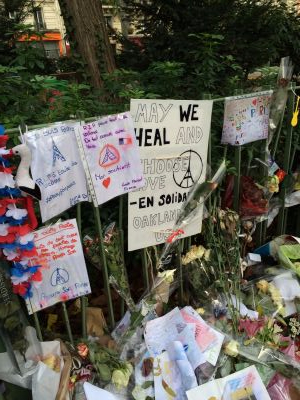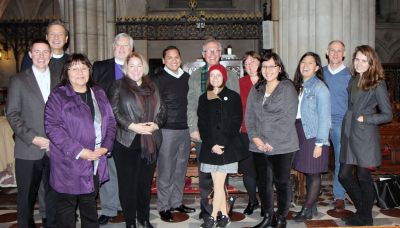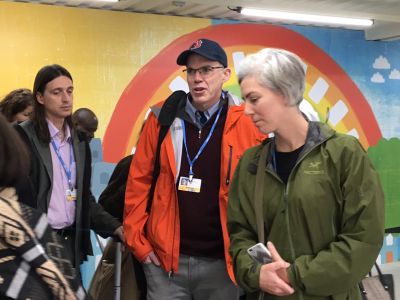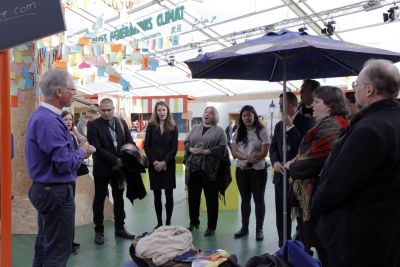Dean Richardson Reports from the Paris Climate Change Conference
From December 5-10, the Very Rev. Mark Richardson, dean and president of Church Divinity School of the Pacific, attended the Conference of Parties, the international climate change conference in Paris. He was part of the official delegation funded to represent the Episcopal Church at the event.
December 5: A Wound in Paris
I arrived in Paris and there was little sign of extra security, but who knows what is behind the cameras?

After getting through security and to the hotel it was early afternoon, with little chance to get to the COP21 pavilion for a session. I walked the streets near the hotel instead and only three blocks away was one of the major memorials for those who died in the attack of a few weeks ago. Flowers and pictures lined a park wall for at least two blocks, across the street one of the cafes that had been the site of this attack. It reminded me of living in NYC when memorials popped up all over NYC after 9/11. NYC continued the affairs of daily life but people carried inside a sadness they could not sweep away; it took time. The people of Paris do not seem to be paralyzed: sidewalk cafes still open and bustling, people shopping, but one feels the wound in their presence, and the memorials bear testimony to this.
Tonight our delegation meets for dinner and we will hear instructions about our deployment over the next several days. I heard from Bishop Marc [Andrus] and received his warm welcome. He was up at the conference today right on schedule to gather people for prayer in the heart of the pavilion. I look forward to joining him and others in the days ahead.
December 6: How Do We Have Conversations About Climate Change?
Sunday was a great day of being with the church in Paris. Our delegation gathered at the American Cathedral in Paris, first to hear a forum presentation by George Marshall, a social anthropologist who is renowned internationally for his work on public conversation skills especially for discussing issues of great concern. He was there to help us address the question: “How do we have conversations across our deep cultural polarization on the issues of climate change?” This seemed so important to share with our seminary community. Soon we will build into our curriculum at Church Divinity School of the Pacific the learning of skills of conversation.
According to Marshall, we will not communicate with those who hold differing points of view from our own on issues of climate change until we listen deeply to the values and identity issues that motivate them. When we listen for these things we begin to build trust, and this personal and relational level is essential to forward progress. We need to learn from each other those things that will motivate change in us. He had some wonderful anecdotes to illustrate his point.
The Rev. Fletcher Harper, executive director of Greenfaith, an important player in the climate change conference, preached at the principal service. I loved being back at the Cathedral after my visit with my wife, Brenda, this summer and renewing connection with friends there. Bishop Pierre Whalon and Dean Lucinda Laird were wonderful hosts.
The Cathedral is impressive for the kind of leaders in the congregation. I met an international lawyer in the congregation who was on his way to meet with theEgyptian representatives at the Climate Change conference who are his clients. Before he left, he shared some fascinating stories and his hopes regarding the activities at the conference.

(photo credit: Lynette Wilson)
This afternoon, the delegation was left to some leisure, and to prepare material on specialized topics we have been assigned for our participation tomorrow in the “green zone,” the location of non-legislative bodies. It is where important networking and learning goes on, and bottom-up organizing that has impact we cannot measure on those who must sign the agreements. In my leisure I enjoyed the company of John and Julia McCray Goldsmith, and Grace Aherne, who formerly lived in California and is now chaplain at the University of Virginia. A very good day for this jet lagged dean and president!
December 7: Learning About Renewable Energy
Our day as delegates from the Episcopal Church to the Climate Change conference began with early morning edits of an official letter from the Church to the representatives in the legislative sessions. It had to go from our hands back to NYC for approval and then return before delivering this afternoon. It is in response to some goals already set, and encouragement of certain actions yet to be taken.
We arrived for our first day at the Pavilion, the gathering place of thousands of non-legislative delegates from many organizations. I attended a meeting on “North American climate collaboration” with an interdisciplinary group attempting to integrate efforts across a wide range of science, technology, and business.
Then at noon, Bishop Marc Andrus gathered us in a public space under “the prayer umbrella” for singing, prayer and meditation. We are centering our mediation on one of the four themes each day: reverence, compassion, forgiveness and reconciliation. Our goal in this short time is to fill the space with this prayerful spirit which really comes from many people back home as well as within this huge space. Imagine singing with all kinds of activity and chaos around you, hundreds of people walking by wondering who you are and what you are doing. (A parade of people dressed as penguins came marching by with their own tune at one point.) Some stopped in curiosity to listen to our singing, others to joined the circle.

In fact, in just five minutes I met with two who stopped: Mohammed El-Hadi Khalifi, president of an investment bank in Sudan, who came solely to connect investment funds with groups pursuing green technology solutions in sub-Saharan Africa; and Vincent Powlowski from Arizona, who founded the Association for the Tree of Life, dedicated to organizing in response to climate change.
Since we at Church Divinity School of the Pacific are new participants in solar energy, in the afternoon I attended a panel presentation on “Renewable Energy and Intermittency.” The idea of intermittency is that in the diverse menu of renewable energy sources–hydroelectric, geothermal, solar, ocean currents, wind, and bio-mass–there will be fluctuations and times of unpredictable fluctuation. Solar is a case in point: it is a very powerful source, but there are times when it is not easy to predict excess production on the one hand, or insufficiency in meeting demand on the other hand (in contrast to geo-thermal, for example, which is constant).
The point is that we are headed toward an era when societies will cooperate in producing a variety of renewable energy integrated into a single system. This really took me out of a certain kind of isolation in my attitude about producing solar at CDSP: “we’ll produce for ourselves and sell a little to the grid.” What if we began to think of our production as fitting into a larger system where diverse sources of renewable energy were feeding into a public grid to meet the public demand?
Mind-opening meetings like this are happening all over the pavilion all day, every day, for two weeks. It is not only a privilege to hear these presentations; it is also impressive to encounter very bright engineers, social psychologists, city planners, ecologists and others who have dedicated lifetimes to realizing outcomes that are essential to our future on this planet.
I discovered in the evening that this is truly not the work of heroic individuals, but of collaborating communities and leaders. At a concert event in downtown Paris, we paid tribute to heroes from all over the globe who were saving forests, protecting communal lands and being leaders in global adaptation. In each case, it was communities, not individuals, being honored, and communities accepting those honors. It was quite a moving event, emceed by Alec Baldwin.
December 8: The Inner Dimension of Climate Change
Today I met today with a pastor in the Swedish Church who wrote that church’s document titled “A Bishops’ Letter About the Climate.” Sweden is largely regarded as a world leader in the march toward a carbon neutral economy. By contributing their share to a global fund to support island peoples and other poorer nations, they are also leading in the effort to assist the people most vulnerable to climate change. Compared to the United States, their per capita contribution is staggering.

(photo credit: Lynette Wilson)
Traveling to the pavilion, I had a chance meeting with Bill McKibben among the hundreds loading onto buses. We talked on the way to the conference. I’ll hear him speak tomorrow. Once we arrive, we pass through a checkpoint that is like those at the airport. Bags are x-rayed, belts come off, and all the rest.
At our Episcopal worship today, we marched with musicians around the pavilion singing hymns before going to our gathering place for reflection and prayer. This offends my natural shyness about such things, but I must admit it drew some to join us.
Would you ever expect to hear Inuit rap music? Today at lunch I heard it for the first time. It has kind of had an Arctic Indian twist to it.
After our prayer gathering today, I attended a session on “Adaptation in urban contexts worldwide,” which included health experts, city planners and others who have attempted over the years to prepare cities for fatalities from heat or floods in light of the inevitability of climate change. These climate extremes first impact the most vulnerable people: infants, elderly, the poor. Proactive urban planning, education, and communication have achieved remarkable results; for example, a record heatwave in Ahmedabad, India in 2010 killed 1300 people. After coordinated, proactive planning, the next heat wave of comparable duration and temperature killed 20.
In this same session, it was interesting to hear from Governor Brown’s top planning official, Ken Alex, who made a case for why California is so far ahead of most states in the U.S. in planning for climate change and in initiating mitigation of carbon emission. Since 1970, particulate pollution in California has been reduced by 95% and by 2030 the goal is 98%. This success, Alex said, is due to the time and expertise that California devotes to identifying the problem and providing a regulatory response. The state regulatory bodies press the business community to meet higher standards, and eventually business innovation follows. From there, requirements to meet environmental standards tighten in increments.
Many remember Los Angeles of the 1970s as the Beijing of today. You couldn’t see more than a block on bad days. I remember competing in a track meet at UCLA then and having to adjust warm ups to avoid sickness before the competition. So California has changed. Today, whereas many states in the U.S. are very anti-government and anti-regulation, California is not afraid of regulation, and is a case study in why it matters. (Okay, that’s as political as it’s gonna get in this communication!)
The point from this panel was that climate change resilience is “win-win.” Change does not mean sacrifice, which is the great fear of those who resist. Change toward renewable energy sources and lifestyle change lead to better quality of life, better health, money savings, and in many cases, job creation.
The next panel, led by Catholic, Buddhist and Hindu leaders, was titled, “The Inner Dimension of Climate Change.” Their question: “What is the Connection between Social Violence and Violence Against Nature?” The message shared among the speakers was that change in technique, finance and governance in response to climate issues will change nothing—mere band-aids—if we do not motivate a spiritual change of heart in all of us toward others and the natural world. We are in pain and we are inflicting pain, creating deserts of the heart as we create natural deserts globally, to paraphrase Pope Francis.
The message was consonant across all the traditions represented on the panel. The internal root of this violence is separation from ourselves, from others, and from the natural world. We are attached to our subjective ideologies and attached to our desires, and things that threaten this insular individualism lead to violence. But this alienation is a trap. The message of all the traditions is that we need compassion, reverence for the ground of our being, and reconciliation. Our Episcopal worship this week has centered on these three themes, among others. I was moved by the clarity, depth, and common voice coming from many religious traditions of the world. It reminded me of the richness of our context in the Graduate Theological Union.
I ended the day by traveling back downtown to the American Cathedral for interfaith prayer, singing and testimony which took the message of the session I’d just attended and placed it in the context of prayerful practice. We ended in music led by a group of pilgrims who had walked the 1500 kilometers from Rome to Paris for this conference. Their goal was to leave the message of love and hope with each step, and they discovered along the way that it was they who were given love and hope by those who received them. You could feel in their words, in their music, that this had been their experience. This was a wonderful prayer of gratitude to end the evening.
December 9: Prayer, Debate, and a State Department Briefing
I am impressed with the chance meetings and unpredictable conversations at events like this climate change conference involving thousands of people. As I traveled by train to the day’s events, I conversed with Arif Rahman in the Pakistan government’s delegation on environment and development. He shared a momentary doubt about the value of the conference: “I think of the investment Pakistan made to send its delegation. We could have built a school. We must be serious about what we are doing.”
We talked about family, and he lit up telling me about his children and how his parents who live in the same village in northern Pakistan were doing in old age. Basic human and personal things linked us. We both were reminded of the loves and longings that bind us,reminded of the simple but deep needs that make life on this globe so precious. We were ready to go to work.

(photo credit: Episcopal News Service)
Right on time, our noonday prayer group gathered, marched and sang accompanied by accordion, clarinet, string instrument, and drum. Yes, you read it correctly. Quite a combination! As we marched through the pavilion, more began to join us: participants from the Micronesian islands threatened by inundation as the globe warms and waters rise, a Kenyan reporter, young people from the U.S. who are religiously unaffiliated, and more. Bringing prayer to a space of debate and technical discussions was uniquely moving. Later, the Kenyan reporter interviewed me, and in tears stated that he needed this time to pray with others in the midst of serious and frightening challenges.
Each day, the noonday prayer ends in a lunch gathering, and I have enjoyed this time with friends and fellow delegates before launching into our several paths for the rest of the day. In my case, the afternoon began in a meeting on “free trade and climate change” that examined some of the ways in which international trade agreements are apparently at cross-purposes with new directions needed to face climate challenges. It was essentially an urgent plea for a re-balancing of interests and power and for regulatory measures that protect against the excesses of a fossil-fuel based economy.
There is debate over differences in this pavilion. Should nuclear power be in the energy future or not? Is carbon trading the best method toward a policy of a carbon neutral future, and, if so, what should the caps be? Is a multinational agreement worth anything without enforcement? What are the developed world’s obligations in the face of loss and damages experienced in the developing world?
Late in the afternoon, Jessie Young, a State Department representative, visited our delegation to brief us on the status of the climate change negotiations and timetable for reaching an agreement. Our conversation with her lent perspective on issues including the complexity of bi-lateral discussions with India, whose interests run counter at times to near-term carbon reduction; transparency among nations and the monitoring of their commitments; how to determine developed-world contribution to adaptation in the face of current climate disasters; setting goals for the future; and the unpredictable path toward meeting them assuming the will, intelligence and commitment is in place to do so.
To learn more about the Episcopal Church’s presence at the Paris conference, read Episcopal News Service coverage.

